Guide to Tankless Water Heaters
With the rising cost of energy and an increasing conscientiousness about our use of the earth’s resources, it’s no surprise that tankless water heater installations have been rising in popularity in recent years. Tankless water heaters take up less space, deliver hot water on demand and can save you money on your monthly electricity bill.
We’re going to take a close look at the differences between traditional tank and tankless water heaters as well as some factors to consider so you know how to choose a tankless water heater that fits your lifestyle.
How Do Tankless Water Heaters Work?
Traditional tank storage water heaters hold a certain amount of water and use electricity or fuel to keep the water hot at all times. Whenever the water’s temperature starts to dip below the specified heat level, a thermostat signals the system to heat back up. With a tank of hot water in your home, you can turn on any faucet or fixture and quickly have running hot water.
As the name suggests, tankless water heaters function without a tank. So how do they work? Rather than keeping a tank of heated water at all times so it’s ready when you need it, tankless heaters heat water as it flows through the system, which contains a heat exchanger powered by either gas or electricity. Water only flows through the system to be heated when you turn on a faucet or fixture.
In other words, you heat the water in your home on demand rather than keeping a reserve of water heated at all times. This is why tankless water heaters are also referred to as on-demand water heaters.
Tankless vs. Tank Storage Water Heaters
When you’re deciding whether to install a standard tank water heater or a tankless one, it’s helpful to compare these options in a few different ways. Let’s take a look at how tankless and tank water heaters stack up when it comes to lifespan, efficiency, cost and convenience.
How Long do Tankless Water Heaters Last?
When you’re paying to replace a water heater in your home or to install one in a new home, you may wonder how soon you’ll have to incur this expense again. So, how long will a tankless water heater last? This is one of the areas where tankless water heaters outshine tank storage heaters.
Tankless water heaters typically last between 10 and 15 years, and if properly maintained can last over 20 years, according to the U.S. Department of Energy (DOE). Tankless heaters are also designed to be easy to service when parts need to be replaced which can allow a tankless heater to easily last for much longer than its life expectancy.
Homeowners understand how common it is to have to replace appliances in their home, so knowing you can count on your water heater to work reliably for more than two decades is a comfort.
How Efficient are Tankless Water Heaters?
Perhaps the main draw that causes homeowners to consider installing a tankless water heater is their reputation for energy efficiency. According to the DOE, tankless water heaters can be anywhere from 8 to 50% more efficient than standard tank heaters. The amount of energy savings your household experiences depends on how much hot water you use on a typical day. The less hot water you use, the more energy you’ll save by using a tankless heater.
This is because your water heater won’t waste energy keeping water hot for hours on end when it’s not needed. A tankless heater will only heat the amount of water you need. For the greatest energy savings, you can install multiple tankless water heaters throughout your home so hot water doesn’t need to travel far to make it to your shower or sink.
Keep in mind that energy efficiency does not translate directly into savings on your energy bill, though it can. Tankless water heaters do generally cost less to operate than tank water heaters, but as we’ll see, the biggest difference in operating cost is between gas and electric models. Cost aside, more efficient energy use makes tankless waters a more environmentally-conscious choice compared to standard tank models.
What are the Costs of a Tankless Water Heater?
There are several factors to consider when you’re comparing the cost of standard and tankless water heaters. There’s the cost of the unit itself, the cost to have it installed and ongoing operating costs. The total cost you’ll pay to have a tankless water heater installed depends on a few factors, including:
- Electric vs. gas: Whether you choose an electric or gas model may influence your upfront cost. Typically, gas models cost a bit more to install compared to a similar-sized electric model. This may not be the case, however, if you are replacing an existing gas heater. Keep in mind, also, that gas tankless models tend to incur lower operating costs than electric, so they can save you money in the long run.
- Size: One of the biggest determining factors when it comes to cost is the size of the tankless heater you purchase. The higher the heater’s capacity, the more it will cost. Price ranges you find online tend to start with the price for small, point-of-use units, so the higher end of these ranges will give you a better idea of what you’ll pay for a whole-home system.
- Existing setup: Your existing setup can also influence the cost of a new tankless heater installation. For example, if you need electrical updates to accommodate an electric heater or if you need a new hose for a gas heater, these additional requirements can add to the cost. Once you have a tankless heater installed, replacing it in the future should require relatively little labor.
Generally, the cost to install a tankless water heater will be higher than to install a traditional tank heater. However, you’ll experience a return on your investment since tankless water heaters eliminate waste and, therefore, cost less to operate. According to Consumer Reports, an electric tankless heater saves homeowners an average of $44 per year, and a gas tankless heater yields an average savings of $108.
How Convenient are Tankless Water Heaters?
Most homeowners also want to know how tank and tankless water heaters compare when it comes to convenience. We all depend on hot water in our homes to wash dishes, wash clothes, take showers and more, so you want to make sure you’ll have access to hot water whenever you need it. The convenience tankless water heaters offer is one of the primary reason some homeowners consider making the switch.
Tankless water heaters heat water on-demand and continue heating water as long as you need it. This means, even if your whole family takes showers in succession, the hot water will never run out. You can even get hot water faster in most cases than you could if it were coming from a tank. This difference is especially noticeable when you run the faucet to wash your hands and feel the water rapidly change from cold to warm.
If you want to use a lot of hot water simultaneously in your house — say, run multiple showers at once — then you’ll want to make sure you select a tankless model large enough to keep up with that hot water demand. Tankless water heaters typically heat water at a rate between two and five gallons per minute (GPM), so you’ll want to find one at the higher end of that range. In especially large households, installing multiple tankless units is a great solution.
Another way in which tankless heaters are more convenient is that they take up far less space than standard tank heaters. This frees up space in your basement or utility closet where a bulky tank would otherwise be.
Tankless Gas vs. Electric Water Heaters
We’ve already referenced some of the differences between electric and gas tankless water heaters, but let’s take a moment to do a direct comparison so you can choose the best option for your family. We’ll look at a few ways in which these options differ:
- Installation: Electric water heaters tend to be cheaper and easier to install than gas-fired models.
- Operating costs: Gas tankless water heaters cost less to operate since the cost of natural gas tends to be lower than the cost of electricity. Consumer Reports used average rates of electricity and natural gas to determine that an electric tankless water heater could cost around $535 annually to operate while a gas model would only cost about $195.
- Efficiency: If you’re more concerned about energy efficiency than you are saving on your energy bill, then you may want to opt for an electric water heater since electric models are more energy-efficient than gas models.
- Capabilities: Gas heaters have more heating power than electric heaters, which makes them a better option for houses in colder climates or households that place high demands on hot water. Electric models tend to be better options for homes with one or two occupants.
- Maintenance: Gas tankless heaters often require more maintenance than their electric equivalents, another factor that may tip the scales for electric if you don’t use too much hot water in your home.
What Size Tankless Water Heater Should I Get?
When choosing a tankless water heater installation, proper care must be taken to ensure your home comfort needs will be met. An inadequate heater will not supply enough hot water during peak usage times, whereas an unnecessarily powerful setup will negate the savings of going tankless.
For an apartment or smaller home, a single unit may be sufficient. Larger homes will experience more convenient access to hot water by installing a series of point-of-use heaters in strategic places throughout the home and can still see cost benefits. Home Climates can help you calculate your requirements — including the number of people in your home and the number of appliances requiring hot water — and choose the right tankless water heater installation for you.
BTUs
We already mentioned that gas heaters tend to have more heating power. You may be wondering, though, how heating power is measured. The unit of measurement you can use to compare the heating power across different models is the British thermal unit (BTU). This unit tells you the amount of heat it takes to increase the temperature of a pound of water by one degree Fahrenheit.
The important thing to know when it comes to BTUs is that the more BTUs your unit has, the more heating power it’s capable of. So, how many BTUs should your water heater have? The answer depends on your water heating needs. If you live in a colder climate, you’ll need your water heater to work harder to get the water up to the desired temperature, typically 120 degrees Fahrenheit.
Water Flow Rate (GPM)
Since tankless water heaters heat water as it flows through the system, another relevant measure of a system’s output is its flow rate, measured in terms of gallons per minute. What is water flow rate? In this case, it’s a measure of how many gallons of hot water your heater can deliver in a minute. A helpful way to determine whether a tankless water heater offers a high enough flow rate for your home is to think through a common scenario in your home involving hot water use.
For example, if you want your water heater to keep up with providing hot water for a shower and a sink faucet at the same time, you’ll want to check the flow rates of these fixtures and add them together. Showerheads produced since 1992 have a maximum flow rate of 2.5 GPM. A bathroom sink faucet will have a flow rate around 2.2 GPM. Together, these fixtures demand a hot water heater with a flow rate of at least 4.7 GPM.
This is toward the higher end of the range of flow rates you’ll find on tankless water heaters. You may want to opt for fixtures with low flow rates or install multiple tankless heaters for more appliances.
What Is the Energy Factor (EF) of Water Heaters?
The efficiency of water heaters is determined by their energy factor (EF). This measurement is determined by tests the Department of Energy has designed to demonstrate the ratio of useful energy output to the overall amount of energy a water heater consumes. In other words, a unit’s EF tells you how efficiently it uses fuel.
The more fuel it wastes, the lower the EF rating. A high EF rating means the water heater is exceptionally energy efficient. Energy Factors for modern tankless water heaters can range from .64 to .91, and even as high as .99 for electric models. These ratings are higher than typical EF ratings for standard tank heaters.
Elizabethtown’s Tankless Water Heater Installers
Hot water is an essential part of your year-round home comfort. If you’re in the market for a new, energy-efficient tankless water heater or need a local expert to provide a cost-effective service call for your current unit, Home Climates can help. We offer comprehensive tankless water heater installations in Elizabethtown and central PA, as well as expert repairs and regular maintenance.
We can also talk through your home’s hot water needs to help you determine if you should get a tankless water heater and if you need an electric, gas, or tankless water heater in your home. Not all tankless water heaters are created equal, so it’s helpful to learn more about which water heating option is best for your family. Home Climates sells and services both gas and electric tankless water heaters to fit almost any budget.
Contact Home Climates today for tankless hot water heater installations in Elizabethtown, Lancaster and throughout central Pennsylvania. Home Climates can also provide professional repairs to ensure your unit continues working at its best. Call us 24/7 for emergency service. Because we know how important hot water is to your life, we’ll go out of our way to ensure you have it when you need it most.
While a tankless water heater requires very little in the way of regular maintenance, we can also provide periodic checkups to identify potential problems and take corrective action ahead of time. Whatever your plumbing needs, Home Climates is here to help.











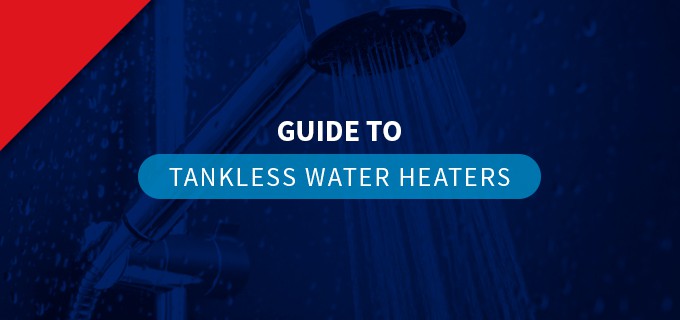
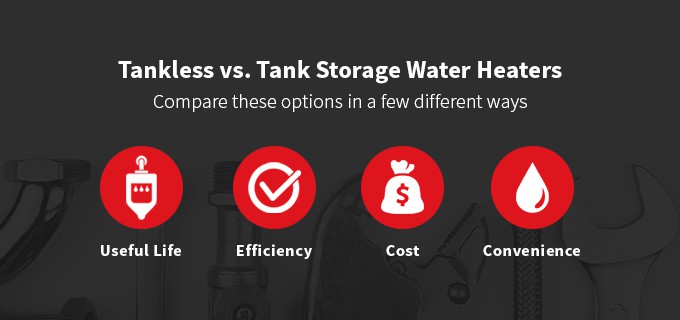
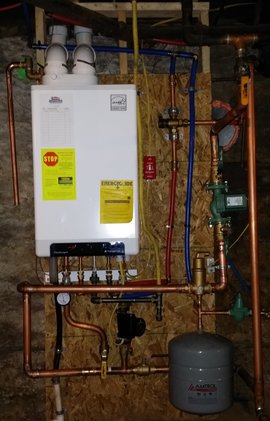
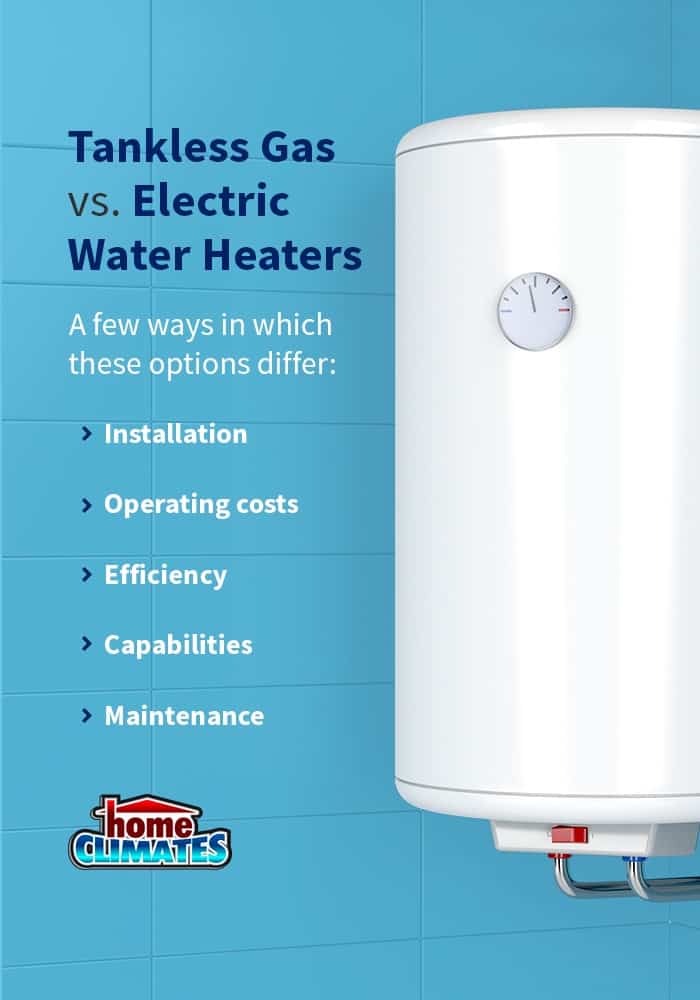
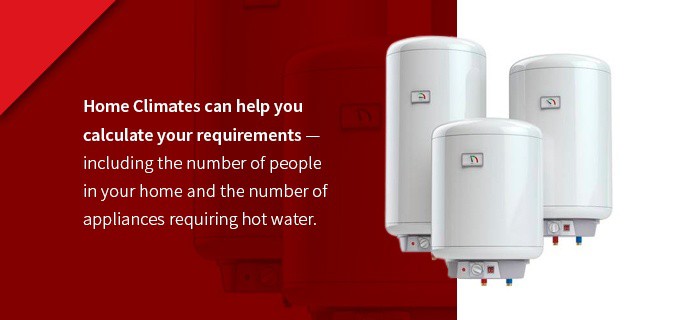
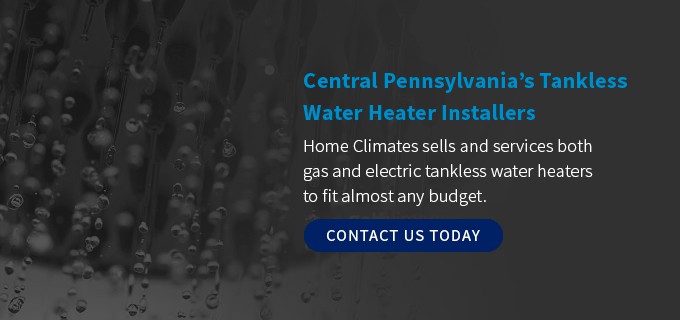
 Reviews
Reviews
